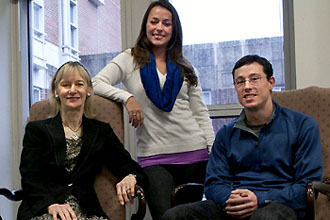Pro Bono Work Earns Top Award
“Non sibi, sed suis,” Tulane's motto reads, instructing citizens to act “not for one's self, but for one's own” to look outward, to the community of which they are a part. Fulfilling that motto through its commitment to public service, Tulane Law School has been recognized and applauded by the Pro Bono Project of Southeastern Louisiana, which named Tulane the 2010 Law School of the Year.

Julie Jackson (from left), director of the law school's pro bono program, is proud of the pro bono work by students such as Kallin Brooks, third-year law student, and Richard Kilpatrick, in his second year. (Photo by Claire Barry)
The recent award recognizes the law school's longstanding and flourishing dedication to pro bono work.
In 1987, Tulane was the first law school in the nation to institute pro bono service as necessary to graduate. Since then, the law school has remained committed to the New Orleans area and to the ideals of public service. Each student is required to perform a minimum of 30 hours of pro bono work the content of which can vary from volunteering at public legal services clinics to research and legal writing projects benefitting the underserved. All work is performed under attorney supervision.
“It is important that law schools emphasize the needs of the community, and make students aware of the legal needs and the lack of access to justice,” said Julie Jackson, assistant dean and director of the Tulane's pro bono program. “There certainly aren't enough valid legal services that are affordable.”
Jackson noted that, in the wake of Hurricane Katrina, students have increasingly taken the initiative, with many far surpassing the 30-hour requirement. Some students have reached up to 500 volunteer hours during their three years in law school.
For Jackson, the benefits of pro bono public service are mutual: The community is strengthened by heightened access to legal avenues, and students gain in both legal experience and civic perspective.
“We can't necessarily solve the problem,” said Jackson, “but we can help and make more and more of an impact each year.”
Cody Wild is a first-year student studying English and political economy.
